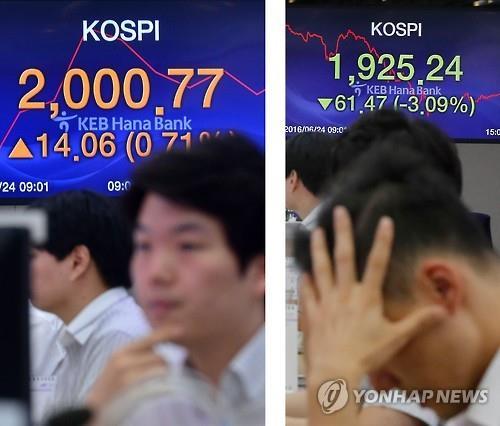The Korean financial authority on Wednesday unveiled a draft of new measures for the country’s money market to increase access for institutional investors and reduce potential risks accumulating in the market. The money market is where financial products with maturities less than one year are traded, such as calls, repurchase papers, certificates of deposit, commercial papers and asset-backed short-term bonds.
Repurchase papers, more frequently referred to as repos or RPs by market participants, account for 44 percent of all transactions in the Korean market and has been the driver behind its growth from 68 trillion won in 2011 to 88 trillion won last year.

The envisioned measures seek to address the RP market, in particular.
As much as 90 percent of all RPs traded here are overnight ones having the term of just one day. This makes it hard to keep enough liquidity in the market for a longer period, the regulator says.
“The market excessively relies on overnight RPs and market players and the regulator have limited access to transaction information,” said Jeong Eun-bo, vice chairman of the Financial Services Commission at a public hearing on the measures held at the Korea Financial Investment Association headquarters in Yeouido, Seoul.
According to the FSC’s plan, drawn up after six months of consultations with the Korea Institute of Finance, more types of securities can be used as collaterals for RP transactions by mending the current General Collateral Financing (GCF) Repo system that was established in 2013 but has been shunned by investors due to inconvenience.
Currently, the GCF Repo system allows only treasury bonds and monetary stabilization bonds to be provided as collaterals for RPs. The regulator will expand the scope to a variety of combinations of bonds and securities and allow buyers and sellers to replace their collaterals and extend the roll-overs of the RPs.
“It was inconvenient for investors to replace their collaterals to maintain their RPs because the system requires both buyers and sellers to agree on the type of collaterals,” said Park Jin-young, researcher at Korea Securities Depositary. “We will revise the system in a manner that allows either side can change or choose collateral securities at their convenience, so they can leave the RPs in the market, keeping market liquidity.”
According to the FSC, risks accumulating during short-term transactions in the market may develop into a systematic risk in the event of unexpected short-term liquidity crunch as the world learned during the US-triggered financial crisis in 2008.
“Our market situation is quite similar to that of the US in 2008,” said Jeong. “The regulator will come up with measures to improve regulations regarding commission fees on RP transactions to encourage extending roll-overs and allow more players to join the market.”
The FSC said it will finalize the measures after soliciting opinions from market participants as well as experts.
By Song Su-hyun (song@heraldcorp.com)
Repurchase papers, more frequently referred to as repos or RPs by market participants, account for 44 percent of all transactions in the Korean market and has been the driver behind its growth from 68 trillion won in 2011 to 88 trillion won last year.

The envisioned measures seek to address the RP market, in particular.
As much as 90 percent of all RPs traded here are overnight ones having the term of just one day. This makes it hard to keep enough liquidity in the market for a longer period, the regulator says.
“The market excessively relies on overnight RPs and market players and the regulator have limited access to transaction information,” said Jeong Eun-bo, vice chairman of the Financial Services Commission at a public hearing on the measures held at the Korea Financial Investment Association headquarters in Yeouido, Seoul.
According to the FSC’s plan, drawn up after six months of consultations with the Korea Institute of Finance, more types of securities can be used as collaterals for RP transactions by mending the current General Collateral Financing (GCF) Repo system that was established in 2013 but has been shunned by investors due to inconvenience.
Currently, the GCF Repo system allows only treasury bonds and monetary stabilization bonds to be provided as collaterals for RPs. The regulator will expand the scope to a variety of combinations of bonds and securities and allow buyers and sellers to replace their collaterals and extend the roll-overs of the RPs.
“It was inconvenient for investors to replace their collaterals to maintain their RPs because the system requires both buyers and sellers to agree on the type of collaterals,” said Park Jin-young, researcher at Korea Securities Depositary. “We will revise the system in a manner that allows either side can change or choose collateral securities at their convenience, so they can leave the RPs in the market, keeping market liquidity.”
According to the FSC, risks accumulating during short-term transactions in the market may develop into a systematic risk in the event of unexpected short-term liquidity crunch as the world learned during the US-triggered financial crisis in 2008.
“Our market situation is quite similar to that of the US in 2008,” said Jeong. “The regulator will come up with measures to improve regulations regarding commission fees on RP transactions to encourage extending roll-overs and allow more players to join the market.”
The FSC said it will finalize the measures after soliciting opinions from market participants as well as experts.
By Song Su-hyun (song@heraldcorp.com)
-
Articles by Korea Herald








![[KH Explains] Hyundai's full hybrid edge to pay off amid slow transition to pure EVs](http://res.heraldm.com/phpwas/restmb_idxmake.php?idx=644&simg=/content/image/2024/04/18/20240418050645_0.jpg&u=20240419100350)







![[From the Scene] Monks, Buddhists hail return of remains of Buddhas](http://res.heraldm.com/phpwas/restmb_idxmake.php?idx=652&simg=/content/image/2024/04/19/20240419050617_0.jpg&u=20240419175937)

![[KH Explains] Hyundai's full hybrid edge to pay off amid slow transition to pure EVs](http://res.heraldm.com/phpwas/restmb_idxmake.php?idx=652&simg=/content/image/2024/04/18/20240418050645_0.jpg&u=20240419100350)

![[Today’s K-pop] Illit drops debut single remix](http://res.heraldm.com/phpwas/restmb_idxmake.php?idx=642&simg=/content/image/2024/04/19/20240419050612_0.jpg&u=)